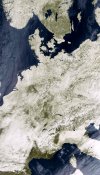 |
 |
|||||||||||||
|
|||||||||||||
|
|||||||||||||
|
Even – or especially ? – directors cannot have their eyes everywhere. They need to gather information and be able to judge things – but how do you do this on a continent where labs can be 3,000 kilometres apart, every country has different forms of governance, and science policy and funding agencies couldn’t be harder to grasp? Global Design Effort European Regional Director Brian Foster has found his own solution. If a reasonable number of high-level European physicists and lab directors come together in one place, he often calls for a meeting of his Advisory Group. One of these European Advisory Group meetings has just happened at DESY, slotted in right after the ICFA and ILCSC meetings, to minimise travel.
Foster's board consists of directors of major European labs and key ILC representatives. At their latest meeting, they mainly took stock of the effects that the "Black December" budget cuts in the US and the UK had on the situation in Europe. “The good news is: people seem to be more dedicated than ever,” says Foster, who is a professor at Oxford university and spokesperson of the Linear Collider UK (LCUK) collaboration, covering all ILC-related activity in the UK. He is thereby directly affected by the UK's withdrawal from the ILC, which he has been campaigning against for the last three months. This meeting, however, concentrated on the broader European and world picture. “So far we don't see any domino effect, on the contrary.” Two new members, India and Spain, have recently joined the GDE effort by agreeing contributions to the common fund. After a broad survey of the recent developments and proposals for involvement in the European Union's Seventh Framework programme, Albrecht Wagner, DESY Director General and Chair of the International Committee for Future Accelerators (ICFA), encouraged the participants to "ensure that the European Union and its expert committees such as ESFRI (European Strategy Forum on Research Infrastructures) are aware that the ILC remains the top priority in Europe for a future accelerator." Subsequently, Foster asked for short summaries from the countries represented on the effect of recent developments in their countries. While Russia, Germany, Italy and France reported continued commitment to ILC with no negative effects on funding, Luis Garrido from Spain said that efforts on ILC detector R&D in his country have doubled recently. “After a very tough couple of months, I have been enormously encouraged by the robust attitude of the European partners in the great ILC endeavour,” says Foster. “This bodes very well as the GDE adapts its plans for the next phase of our project.” The next meeting of the European advisory board is likely to be in conjunction with the ICHEP conference in Philadelphia, US. -- Barbara Warmbein |
|||||||||||||
| © International Linear Collider |
